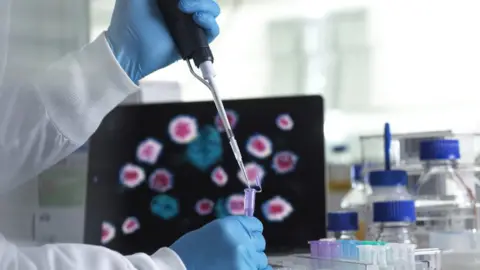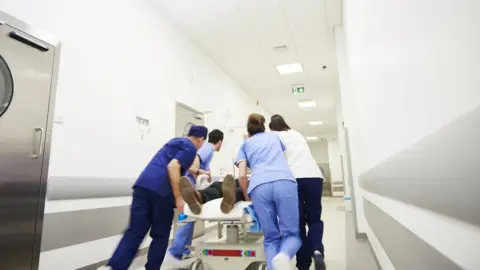Covid-19: Seven cases of Indian variant found in NI
 Getty Images
Getty ImagesSeven cases of the Indian variant of Covid-19 have been detected in Northern Ireland.
It is the first time it has been confirmed in the country but three cases were detected in the Republic of Ireland last month.
Chief Medical Officer Dr Michael McBride said it was not unexpected.
He added: "Confirmation of these cases does not mean this variant is going to become the most prevalent or the dominant strain in Northern Ireland.
"It does, however, highlight why caution is still essential in relation to Covid-19."
He said preventative measures such as travel restrictions were important, but would only delay rather than permanently prevent the spread of variants.
The Department of Health said contact tracing would be part of assessing the public health risk and that the cases were being investigated by the Public Health Agency and the Regional Virology Laboratory.
There are no further details about where in Northern Ireland the cases have been detected.


There is no need to panic - even health officials at the Department of Health appear to be reacting to the news with a reassuring sense of calm. The message - its arrival was inevitable.
It was always a case of when, not if. The fact that the Indian variant of Covid-19 is now here means test-and-trace will step up a gear and the public will again become more vigilant.
The cases are small and are a result of people arriving into Northern Ireland from either the Republic of Ireland or England. Are they linked? Most definitely.
Those affected may have been isolating at home for 10 days having travelled and then passed it on to others. We aren't made aware of the detail to protect the individuals.
I understand that authorities reacted quickly to the cluster and are optimistic they've contained it. Time will tell.
I imagine there are those who will want tighter restrictions around travel into Northern Ireland - but at this stage the NI Executive will hardly agree.
The fact that the Indian variant is in Northern Ireland is a price we are paying for restrictions being lifted.
It is after all all about balance and learning to live with the virus and its variants.
It's a bump in the road, no doubt there'll be others.

Admission rates
On Thursday Northern Ireland recorded 102 new cases of Covid-19 but no further deaths.
There are 67 people in hospital in NI who have tested positive for the virus, but admission rates have slowed, with 56 in the past 14 days.
About 200 cases of the India variant - officially known as B.1.617 - had been confirmed in the UK as of 28 April.
Experts have said there is currently not enough data to make the India variant a "variant of concern".
However, India has said it may be linked to the deadly second wave of the virus which has gripped the country in recent weeks.
Scientists believe existing vaccines will help control the variant when it comes to preventing severe disease.
Dr Lindsay Broadbent, a virologist at Queen's University Belfast, told BBC News NI: "In terms of transmissibility, we still think that the UK variant, the Kent variant, is the most transmissible variant out there.
"While the Indian variant might be more transmissible than the original variant of coronavirus, we don't have to be overly concerned, because we know that the predominant strain is the UK variant and we've dealt with that OK."
 Getty Images/gpointstudio
Getty Images/gpointstudioDetails of a £500 special recognition payment for healthcare workers are still being finalised, according to the Department of Health.
It is hoped that the money will be paid by July.
In a statement, the department said it was "working to issue payment of the award to health and social care employees in July".
The department also said it was working to "minimise disruption" that the cash boost may have on benefits.
"The department is very aware that any additional income may have unwelcome implications for any individual in receipt of income assessed benefits.
"We have been working strenuously to try to minimise disruption to benefits payments.
"While it is not possible to disregard the recognition payment, HSC (health and social care) trusts will be offering any employee with concerns the option to receive their award in instalments. Staff will shortly be asked to opt-in to that arrangement, if they choose to.
"Staff will now have the opportunity to consider their options and seek independent advice to inform their decision."
A similar "thank you" was announced for healthcare workers in Scotland last November, where it is understood that most healthcare workers received their money by February.
